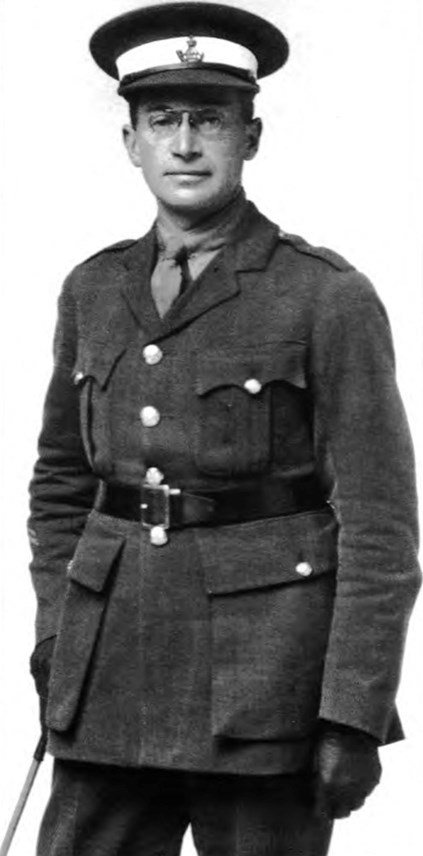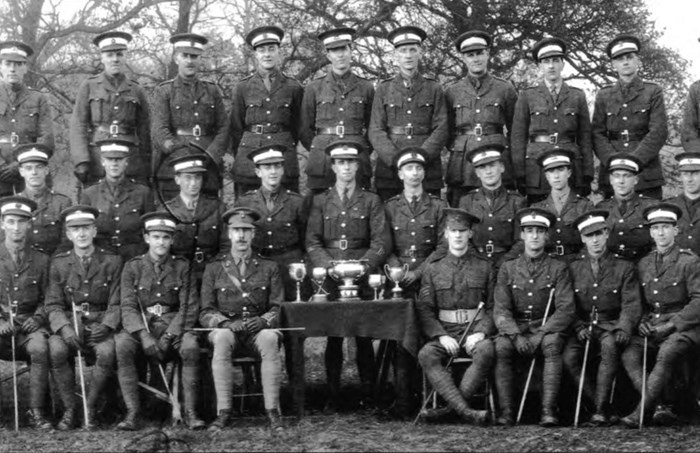The Thing Called 'Armistice' by A S Taylor
- Home
- World War I Articles
- The Thing Called 'Armistice' by A S Taylor
(This article first appears in Stand To! No. 74 September 2005 pp 51-52)
Stand To! 72 had just arrived, and as I sat in my office I eagerly ripped open the package to scan it, before putting it away to read in detail when I got home. At that moment a work colleague came in just as the journal was open at the article on the 15 (Service) Battalion Durham Light Infantry. He said 'My grandfather served in the Durhams in the Great War' - instantly interested, work took second place! The next day he brought in some memorabilia relating to his grandfather - medals, photographs, documents and some magazines. I quickly looked at the photographs which showed officer cadets - identified by the obvious white band and some photographs which appear to have 'The Mutiny March' and 'Mutiny. Catterick (Richmond) Nov 12' written on them. This intrigued me, but I had to wait until that evening to carry out a full examination - when all became clear!

The memorabilia belonged to 276886 Private James Speight of D Company 20 Battalion Durham Light Infantry, the medals being the British War Medal and the Victory Medal. It would appear that he was a pre-war photographer with his own business in Sutton Coldfield - clearly he was a man of 'means'. He joined the battalion in July 1917 in the Ypres area. The Commanding Officer was Lt Col P. W. North. Pte Speight spent time in the trenches and was promoted Corporal and moved with the battalion to Italy. His 'means' allowed a degree of comfort and each week he had his local baker sent, wrapped in brown paper and string, two loaves of Hovis; he mused as to how the ordinary soldier survived without 'extras'.

In summer 1918 he was selected to undergo officer training at Catterick and joined D Company 14th Officer Cadet Battalion; he was destined for a commission in the Royal Warwickshire Regiment. He was under training at the time of the Armistice. On reading the Cadet Battalion magazine, Ultimus, my 'mutiny' question was answered. Officer Cadet Speight had written under the name of 'Osebe' a piece for publication - it is reproduced in full below.
The Book of 'Osebe'
- And it came to pass about the eleventh hour of the eleventh day of the eleventh month there was great rejoicing throughout the land.
- And the people cried with one accord, 'Blessed be the thing called Armistice which is now come about for it stoppeth the shedding of blood, and it maketh the great war to cease, and our enemies are delivered into our hands'. And all were exceeding glad.
- Now concerning certain lusty young men who encamped themselves about the Well called 'Hips', which is in the land called York.
- These are they, very skilled in arms, and knowing many tricks of war, and very swankful. Verily so much so that a seal was set upon them, even unto a snow white band upon their headgear, so that all the people might know and say to one another: 'These are they who live apart and shall one day be placed in authority over the warriors of our King, and are they not called "Cadets" '?
- And at the thing called 'Armistice' these young men also were exceeding glad and did make very merry and in their great joy did many silly things. Some did drink of the 'fire-water', which is called 'spirits', and did get up a pole. And others did fire their muskets, and others did cause to float across the heavens bright stars which are called 'Verys'.
- Yea, verily, so full of joy were they, that they partook not of the food put before them for to eat, nevertheless, though they did seat themselves at their tables, and the serving damsels called WAACs did place the food before them, yet they did not eat it, but threw it about one to another.
- Thereupon arose a great uproar and confusion and much stuff was thrown.
- And of the serving damsels called WAACs some do say the eye of one was smitten with a rissole, feeling her to the ground.
- But the damsels were but the more joyful, and when one who skilled in musick did play upon the spinet, they did dance with the young men called 'Cadets', which was a thing unheard of before that day.
- And it came to pass that for a sign of their great joy some there were of the young men who did make them a great heap of sticks, which is called a 'Bon'.
- And they did set a light thereto and it became a 'Bonfire'.
- Moreover they did fashion an image of the great enemy, William, the son of Frederick, the son of William, and did place the image in the Bonfire.
- Then did one of those in authority hold forth and curse the great enemy, William the son of Frederick, the son of William, and very horrid were the words that fell from his mouth.
- And when the flames did lap about the image, the young men gathered about it did raise a mighty shout and the serving damsels did shriek, yea, some did fall into the arms of the young men, so great was their joy.
- And in divers ways did the young men called Cadets rejoice upon that day because of the thing called 'Armistice'.
- And when they arose at dawn upon the next day, then they did feel exceeding limp, and their heads were very thick. But those, placed in authority over them did say unto them: 'Even so be it, nevertheless thou shalt parade as usual'. 17. And the young men were very wroth and murmured among themselves saying, 'Why should we do this thing? Let us make merry again'. And about six score of them would not do the thing ordered, but banded themselves together and marched away, which was a great scandal.
- And as they journeyed it so fell out that they espied in a wood by the wayside a band of youths skilled in music of bugle and drum. And they called unto them saying, 'Come with us and play unto us and we will give unto thee many pieces of silver'. And the youths did go with them and did play unto them as they did march.
- And behold they drew nigh unto a place called Richmond, which standeth
- And the old men did cheer and the young maidens did smile bewitchingly upon them.
- Now there was a certain young man sealed with the band of white who was the son of Gender, and he had great power among the young men called cadets.
- And he spake unto them saying, 'Now verily ye shall line up in the place called Market'. And they did even as he bid.
- Then said he, 'Ye shall present arms'. And lo! though arms they had not yet did they present them. And unto the players of bugles and drums he said 'Play', and lo, they did play the salute called 'General'.
- And the people that did dwell in Richmond were pleased with the young men and did laugh at their strange doings.
- Other things the young men did but they are not set down in the Book of Osebe.
- And when the day was far spent they returned, yea, even in the same order as that in which they set forth.
- Now those placed in authority over them were sorely troubled all the day and of a surety were filled with a great wind, for they knew not the whereabouts of the young men. But when they beheld them returning in seemly order and each one going into his own habitation they were glad, and each one said to himself 'Thank God', but withal not showing it in their countenances.
- But they gathered the young men about them and spake stem words unto them saying: 'Play ye the game, are ye not sealed with the Band of White? Are ye not called Cadets? Whyfore did ye do this thing?' 29. And the young men spake not a word, and were very meek. But among themselves they did excuse each other, saying - it was the thing called 'Armistice'.





